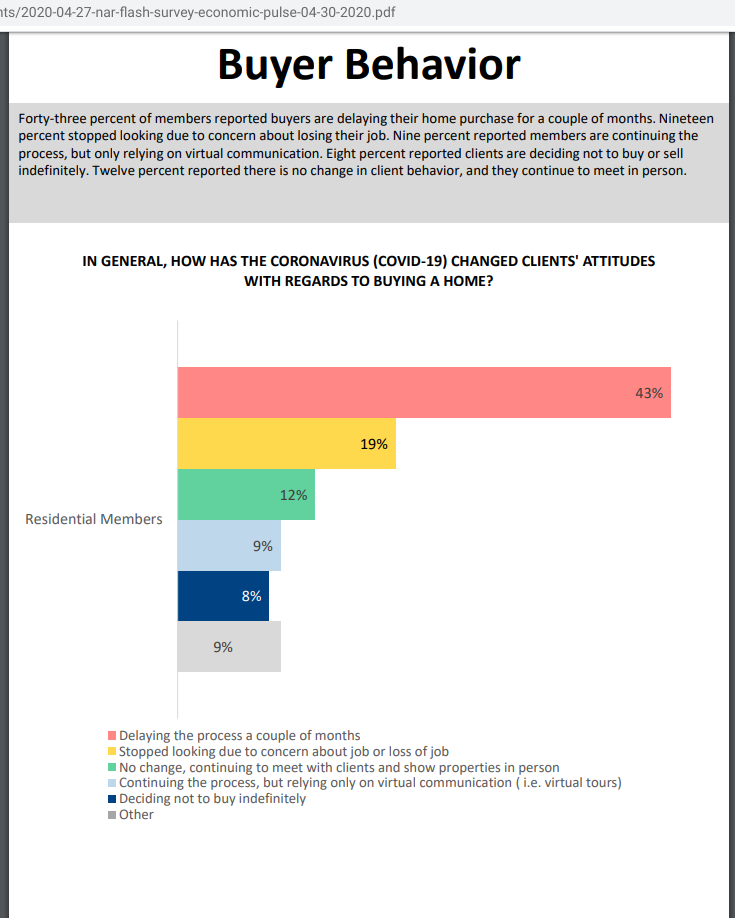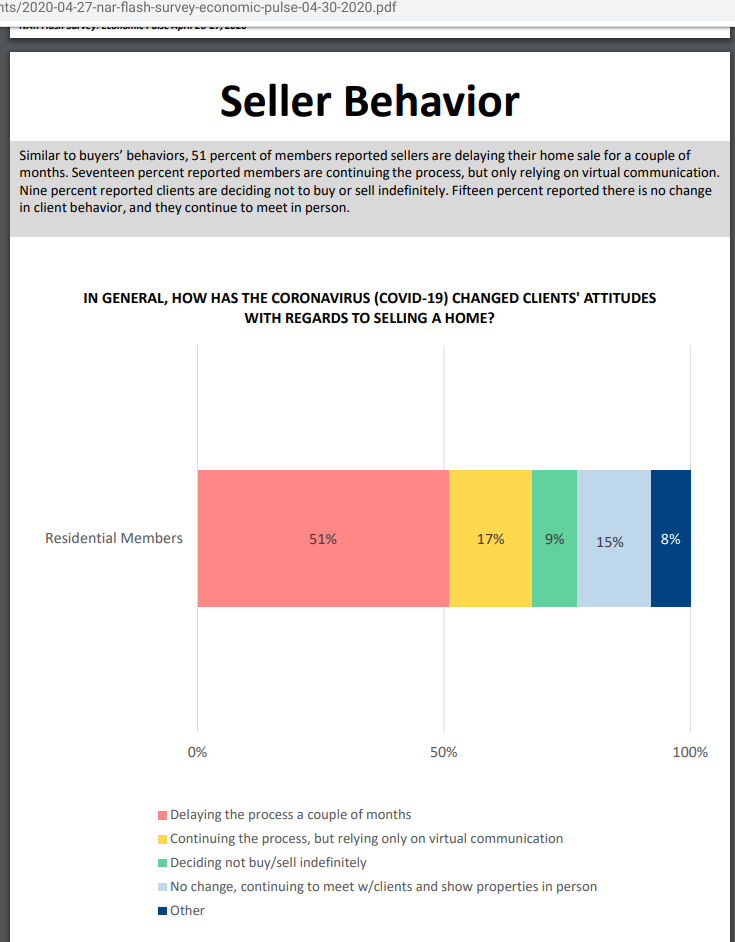As we grow accustomed to our new reality (guided by the CDC and WHO), you might be surprised to learn that buying a house online is a process that was well established in the Old Normal. Buying a house remotely (with zero regrets) is a fairly simple process, so don’t let the fear of the unknown dampen your excitement!
Whether you're just beginning to browse or you’re close to closing, this remote buying process is easier than you may think. This guide will walk you through the whole routine.
Finding Mr. or Mrs. Right REALTOR
Finding the right agent is always the first step when you’re house-hunting, but it’s especially critical to find Mr. or Mrs. Right when you’re trusting them to be your eyes and ears for a remote purchase.
Buying without seeing a house in person means you need an expert in relocation to help guide you through the whole process. This is not the time for the "same old agent" but rather the time to look for the sage wisdom of a REALTOR on both shopping for a home online and what to expect in the purchasing process when buying from afar.
Buying and selling homes remotely is not uncharted territory. In fact, there have been classes and certifications on all types of relocation to aid in REALTOR training for years. I have participated in these classes and put that training to work for years so when it comes to our current lock-down situation, I am prepared... for most of this.
This is one of the strangest markets ever however it’s not totally unfamiliar and I had a lot of tools of the trade that allowed me to stay calm and guide my clients. For example, I am not a complete Germaphobe but I am a planner and I love to be prepared so I had a little stash of face masks, gloves and antiviral wipes in my cabinet. I was certainly not planning on a pandemic but I wanted to have wipes in case the school needed more, gloves for the yucky clean up when someone was sick and masks in case my kid needed an annual check up during the peak of flu season.
Another example, I love things that are easy tech that help streamline and level up my business. I have been hiring pro photographers that do 3D tours and floor plans for a long time for sellers of unique properties. Also, I am always looking for the smartphone with the best quality raw photo/video options when it's time for a replacement because I have helped many relocation buyers and I want to be able to give them a "real" look at a property - not the professionally retouched version.
Many buyers are not comfortable with the technology upon which remote buying (or selling) of homes relies, but as long as the client is receptive to learning, I am delighted to teach and demonstrate.
My confidence and awareness of market trends are two competencies my clients look for when interviewing agents to help them relocate, and there are many, many more things buyers and sellers should reviewing.
When you choose an agent, make sure they are deeply familiar with the city and community. You want someone who knows more than just the average price per square foot and the name of the mayor. Someone who will encourage you to consider commute times, your social desires, and what you want that home to be for you in 5 or 10 years.
The icing on the cake working with a REALTOR is that they will give you access to the MLS, which is, hands down, the most trustworthy source on the housing market data available online. This will be tremendously helpful when you get serious about the next step: house-hunting online.
Start your search online
Shopping for a house online is definitely part of the Old Normal that we’re all used to, but if you’re a serious shopper (unlike the ones portrayed on most of the TV shows and those that are just browsing mansions on Instagram and home search sites), you’ll focus your attention and proceed methodically.
I suggest making a house-hunting checklist and have your MLS search set up with this criteria. If no results return in the search, you know there may be compromise. This is where a deep conversation with your co-buyers and REALTOR about the most important features will pay off.
Next, learn as much as you can about how to shop for a house online.
Keep in mind that looks can be deceiving, so don’t get too caught up with a home that looks perfect in the listing photos. While the style and location may be exactly what you want, it’s layout and finishes are qualities can only be truly appreciated in person. Read all the disclosures, ask detailed questions about remodeling products and professionals used. And before you e-sign on the dotted line, arrange a virtual tour with your trusted agent and/or include a professional inspection contingency.
In a virtual tour, your agent will walk through the house (vacated by sellers) with you on a video chat. You can ask your agent to open doors and turn on lights, look inside closets, and get close-ups of any details in the house that you care to see. It’s not quite the same as being there in person, so ask your agent to also deliver feedback on the sounds, odors, and temperature in the home. This experience offers an impression that is far better than the listing description or photos or virtual tours provided by the seller’s agent.
Make the offer
Up to this point in your remote homebuying journey, your agent has been your best buddy. An endlessly helpful, and knowledgeable confidant who can reassure you in times of doubt and virtual high-five you in times of joy.
But now, it’s time for your agent to be your business partner. It’s time to get all your paperwork in order and hand over the reins to your real estate expert.
These negotiations happen between your agent and the seller’s agent and don’t require anything that can’t be done by phone or email, so COVID19 restrictions can’t put the breaks on this part of the deal.
Having an agent with trained negotiation skills can make or break a deal. An agent that will ask questions about the seller’s motivation (information you’ll never find online) and which terms might be more flexible will help create a win-win agreement and the smoothest possible transaction.
So sit back, pretend to relax, and let your agent work their magic.
Inspection
This may be the one and only insurmountable obstacle in your remote house-buying plan. The impact of the coronavirus is a constantly shifting landscape, and the rules are being written in pace with constant change and adaptation.
In MN, inspectors are part of the essential services included in real estate... but they do have to follow the governors Stay At Home order and abide by CDC recommendations to the fullest extent. This means that you may not get to attend the inspection in person and this can be unsettling for some buyers. It is more important now than ever to thoroughly interview inspectors about their processes, warranties and experience with the location and style of house you are purchasing.
Appraisal
It might be hard to believe, but with so much data available these days, an appraisal can be done without anyone stepping foot in the home. There are many things that go into determining a home’s worth, but the constellation of external factors that determine a home’s current value can be combined with information collected by “drive-by” and “desktop” appraisals to calculate a reliable opinion of value. This may seem like it’s part of the New Normal, but it’s actually pretty well-established.
Title review
A title review is essentially an examination of property boundaries and ownership history. It’s a legal review, looking for any missed crosses on T’s or I’s without dots in the chain of ownership. It’s all done behind the scenes and mostly online in MN so the current pandemic restrictions do not have a big effect on this part of the process.
Final walkthrough
Here’s yet another example of why finding the right agent is super-critical. Your agent will conduct the final walkthrough for you, also over video conference, so you can make sure that any repairs requested after the inspection were made to your satisfaction, and be certain the home is in the condition you want it in.
If you’re feeling shaky about buying a house remotely and want a little more assurance, talk to your agent about how to add a final walkthrough contingency to your contract. With a contingency in place, you can escape at the 11th hour if something has gone terribly wrong.
Closing
The details of this last step will vary state-to-state. Since the E-Sign Act of 2000, e-signatures have been recognized as legally binding, but closing on a home requires more than just an authorized signature, it requires a notarized signature.
Here’s where it gets tricky: some states/lenders allow remote online notarization (RON), and some do not.
It seems that most MN counties are accepting electronic signatures but the lenders do not allow RONs. Don’t fret. Closing is a fairly simple, in-and-out sort of process that can be completed with high regard to hygiene and social distancing. You may be able to go to a branch office of the title company or bank and have a private signing or many will offer to set up a sort of “drive-through” experience where you don’t have to leave your car. If you are quarantined, the document signing could be witnesses by the notary through the window of your home.
(For states that do allow RONs, be sure you’re in close communication with your agent and the title company — make sure you know when the documents need to be received, and how they will be sent.)
Instructions on how and where to wire or deliver your down payment should be made clear to you by your superstar title agent, but if something doesn’t make sense to you, don’t be afraid to ask for clarification. This may be your first remote home purchase, but it’s certainly not theirs.
Next chapter, new house
We’re all looking forward to a brighter future, and for many of us, that future looks a lot like the not-so-distant past. Hopefully, this guide has boosted your confidence and shown you that there is a clear, easy, and well-worn path to buying a house remotely.
THIS JUST IN: National Association of REALTORS (NAR) Flash Survey: Economic Pulse April 26-27, 2020
How is COVID19 affection home buyer and seller behavior?




